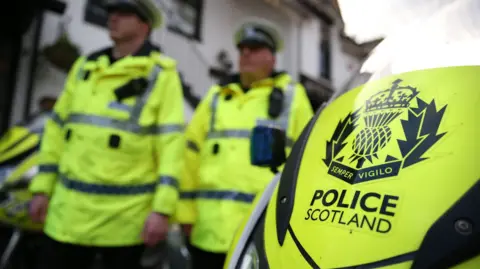Police searches to be based on biological sex
 PA Media
PA MediaPolice Scotland has issued interim guidance around searching transgender people after the landmark UK Supreme Court ruling on the definition of a woman.
The force's new five-page document, which covers searches carried out by transgender officers and staff, says searches will be undertaken on the basis of biological sex.
This means searches will be carried out by an officer of the same biological sex as the transgender person - but if a person requests an officer of their lived gender, police will try to accommodate them.
In April a judge ruled that under equalities law, sex is binary - meaning legally it should be interpreted as referring to either a biological man or a biological woman.
Assistant Chief Constable Catriona Paton said the new guidance was designed to provide clarity around a "complex and important area" of policing.
The force, the UK's second largest after the Met, said it must ensure it is acting in line with its duties under the Equality Act and the Human Rights Act.
It added that officers and staff must feel confident that they are conducting searches lawfully.
The guidance said all searches - in custody or elsewhere - must be undertaken on the basis of biological sex.
It also covers scenarios such as an individual, whose lived gender differs from their biological sex, requesting to be searched by an officer of their lived gender.
Should that happen then efforts will be made to ensure an appropriate officer conducts the search as long as it is "operationally viable".
The guidance said written consent would be required from the authorising officer, the person to be searched, and any officers involved in the search.
The day after the Supreme Court ruling British Transport Police confirmed trans women arrested on the railways would in future be strip-searched by male officers.
BTP also said same-sex searches in custody would be conducted "in accordance with the biological birth sex of the detainee" under updated guidance for public bodies.
'Legal duties'
Assistant Chief Constable Paton said: "This is a complex and important area of policing and searching members of the public is a significant intrusion of their personal liberty and privacy.
"It is critical that as an organisation, Police Scotland continues to fulfil its legal duties as well as ensuring officers and staff feel confident that they are conducting searches lawfully.
"While the guidance will bring clarity to both our colleagues and members of the public, we are acutely aware of the impact and depth of feeling around this issue, both among the transgender community and those who hold gender critical views."
The senior officer said the force's priority was to ensure decisions were made in line with its service values of "integrity, fairness, respect and upholding human rights".
Assistant Chief Constable Paton said the interim guidance would be kept under review as the force awaits the publication of revised national guidance around this issue.
Last week women's rights campaigners handed the Scottish government a deadline to comply with the UK Supreme Court's ruling on biological sex.
In response the Scottish government said it accepted the Supreme Court judgement and was awaiting new guidance from the Equality and Human Rights Commission.
The new police guidance was developed following advice from the force's legal team and independent human rights advisor, Jane Gordon.
Partners including businesses, staff associations, trade unions, the Scottish government were also consulted.
Police Scotland said its wider review into sex and gender was ongoing and further updates would be issued in due course.
A Scottish government spokesperson said: "It is for Police Scotland to decide their operational processes, including their guidance for officers, and ensure they are in line with legal obligations.
"The Scottish government has made clear we accept the Supreme Court ruling and that public bodies have a duty to comply with the law."
BBC Scotland News has asked the Scottish Police Federation for comment.
